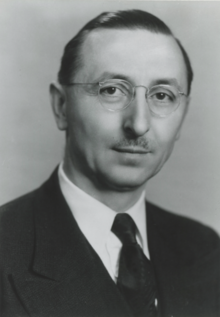Maynard Pirsig | |
|---|---|
 | |
| Minnesota Supreme Court | |
| Personal details | |
| Born | January 9, 1902 |
| Died | February 7, 1997 (aged 95) |
| Spouse |
Harriet Sjobeck (m. 1925) |
| Education | University of Minnesota (Bachelor) University of Minnesota Law School (LLB) |
Maynard E. Pirsig, LLD, (/ˈpɜːrsɪɡ/; January 9, 1902 - February 7, 1997) was an American legal scholar. He was a professor, and dean, of the University of Minnesota Law School; a Minnesota Supreme Court justice; director of the Minnesota Legal Aid Society, and an advisor for the Indonesian, Puerto Rican, and El Salvadoran legal systems. He defined Legal Ethics in the 1974 Encyclopedia Britannica. His law books were widely used in schools across the country, including his casebook Judicial Administration--which Pirsig used for the United States' first law reform course, early 1930s.[1] He was mentored by Everett Fraser, Roscoe Pound, and Felix Frankfurter.
Pirsig wrote in his book, Cases and Materials on Legal Ethics, 1949, "The lawyer's duty is of a double character. He owes to his client the duty of fidelity, but he also owes the duty of good faith and honorable dealing to judicial tribunals before whom he practices his profession. He is an officer of the court--a minister in the temple of justice." Pirsig, supported civil rights, the Equal Rights Amendment, abolishment of the death penalty ("an imperfect system should not be lethal"), Planned Parenthood, abortion rights, a separate juvenile court system, rehabilitation programs for prison inmates, and fair access to the law regardless of income.
Robert A. Stein, former dean of U Minnesota Law School, described Pirsig as "an unpretentious man concerned about the welfare of others".
Maynard E. Pirsig's son, Robert M. Pirsig, authored Zen and the Art of Motorcycle Maintenance, and Lila.